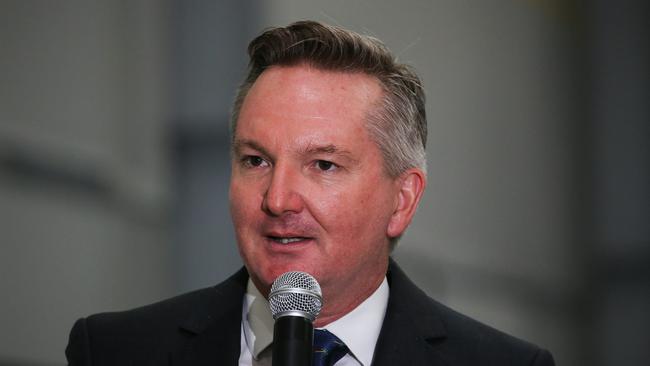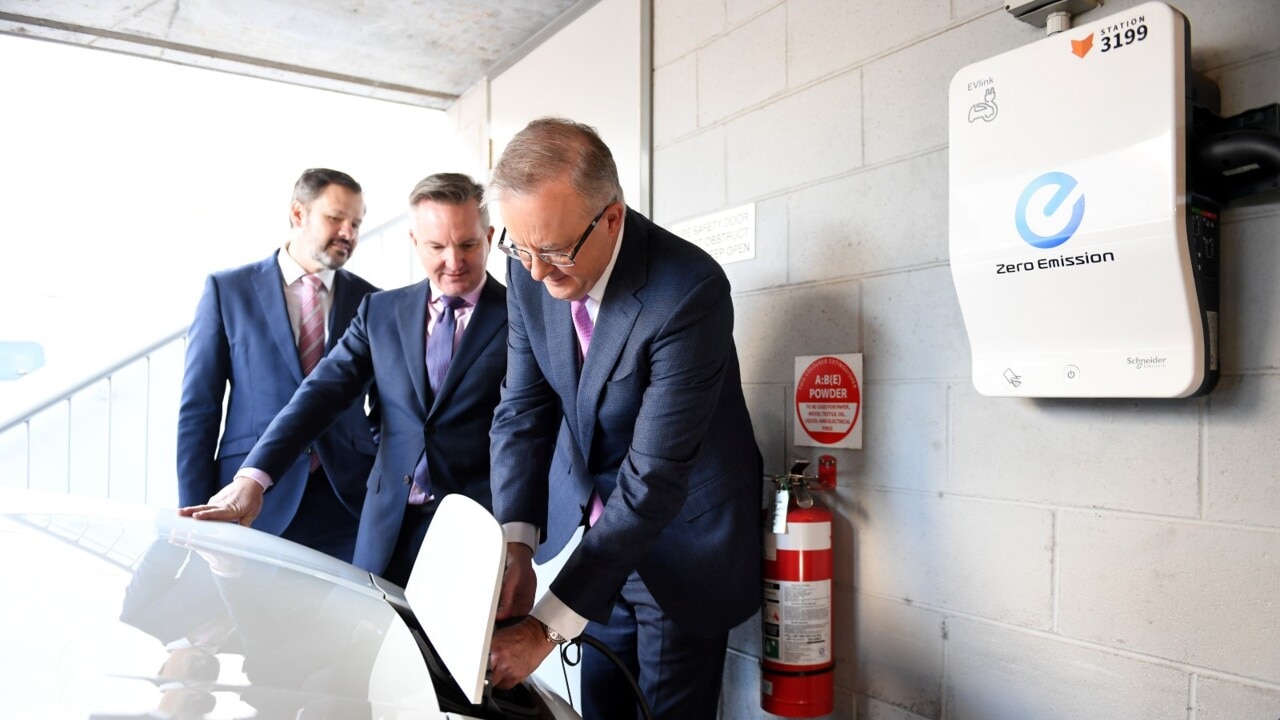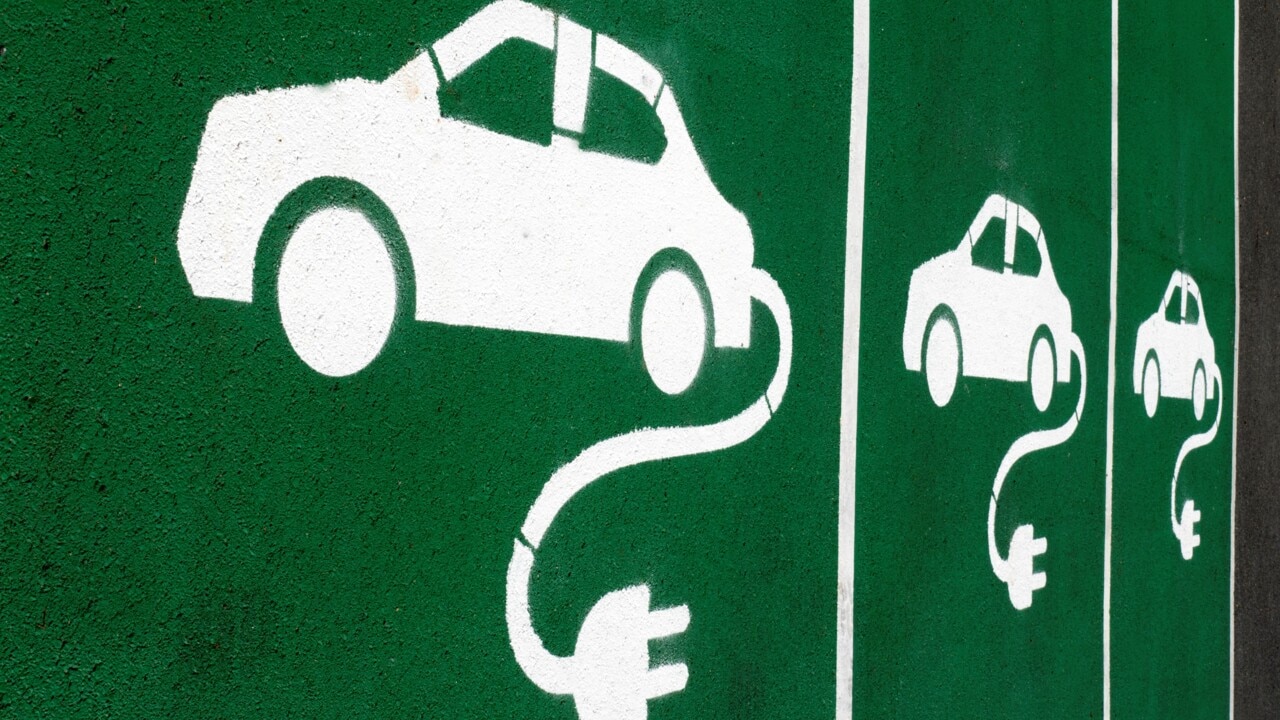Labor’s 2030 electric vehicle target ‘out of reach’, says business
Big business say electric vehicles will make little to no contributions to 2030 emissions reductions targets because not enough people are transitioning to battery-powered cars.

The nation’s top employer groups say electric vehicles will make little to no contribution to meeting Anthony Albanese’s 2030 emissions reductions target due to high costs and a lack of charging infrastructure.
The Australian Chamber of Commerce and Industry and Australia Industry Group on Tuesday flagged concerns for the slow take-up of battery cars, as Anthony Albanese claimed EVs would help “build a better future”.
ACCI chief executive Andrew McKellar warned the government’s targets were “out of reach” and said a slow rollout of EV charging stations and lack of consumer incentives had significantly limited the uptake.
“Many consumers prefer electric vehicles, but the high costs and lack of supporting infrastructure are influencing their decisions and putting the government’s targets out of reach,” Mr McKellar said.
“Consumers are holding back purchasing decisions until they know they will have access.”
Ai Group CEO Innes Willox told The Australian it was “unlikely” the take-up of electric cars would make much of an impact on Labor’s 2030 green targets.
“Unless people start replacing their cars sooner – which looks unlikely – clean, light vehicles will be able to make a big contribution to our forthcoming 2035 emissions goals, but probably not to our current 2030 targets,” Mr Willox said.
Their concerns come after The Australian revealed Chris Bowen’s EV strategy was on track to fail, with government officials predicting fewer than a third of new car sales would be battery-operated by 2030.
The latest estimates from the federal transport department are that electric cars will make up 27 per cent of new car sales by 2030, well below the 89 per cent forecast in Labor’s pre-election modelling that helped boost its 43 per cent emissions reduction target.

In a speech in Sydney on Tuesday night, the Prime Minister reaffirmed the government’s commitment to electric vehicles and criticised former prime minister Scott Morrison declaration that they would “end the weekend” in 2019.
“(We are) supporting the uptake of electric vehicles – because the cars that Scott Morrison said were going to destroy the weekend are part of how we build a better future,” Mr Albanese said.
As the key element of the government’s climate agenda comes under fire, Mr Bowen pointed to problems in the international effort to fight global warming, flagging a push to make China shoulder a heavier burden in cutting emissions and funding climate action.
In a separate speech in Sydney, Mr Bowen said concessions for developing countries in the 1992 global climate treaty should not be “set in stone”.
“Just because a country wasn’t wealthy or was not a major emitter in 1992 doesn’t mean the same is the case 30 years later,” he said in a clear reference to China.
With take-up of electric vehicles languishing behind Labor’s targets, experts warned the federal government has not made enough investments in charging infrastructure.
Former Parking Australia chief executive Stuart Norman said he was “not surprised at all” by the government’s projections for electric car sales by the end of the decade.
In a submission to the government’s consultation for its national electric vehicle strategy, Mr Norman urged Labor to implement policy settings to increase low speed on street charging ports.

About three million Australians do not have access to a driveway or garage, creating a major roadblock to accessibility for charging cars at home.
“This is something here in this debate that has been completely and utterly ignored,” Mr Norman said.
Australian Association of Convenience Stores, representing brands including BP, 7-Eleven and Ampol, called on Labor to fund critical power grid upgrades to allow stations to install fast-charging bays for EVs.
AACS chief executive Theo Foukkare warned there were not enough charging stations to service drivers. “Energy- and environmentally conscious Aussies are expected to drive a significant increase in EV sales this year, but right now there are not enough recharge stations to service existing EV drivers,” he said.







To join the conversation, please log in. Don't have an account? Register
Join the conversation, you are commenting as Logout